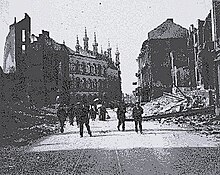German atrocities of 1914
During three weeks in August and September 1914, these acts of violence claimed thousands of civilian casualties, in violation of the Hague Conventions of 1899 and 1907, among a population widely suspected of harboring Francs-tireurs.
Twenty thousand houses were also destroyed, including 600 in Visé[1] and 1,100 in Dinant, Wallonia, the Belgian region on the main axis of the invasion that suffered most from these atrocities.
Even though the German people are traditionally stereotyped as orderly, well-disciplined, and invariably super-efficient,[2] according to Thomas Weber, the real, "situational factors at play", during the August 1914 Rape of Belgium were, "the nervousness and anxiety of hastily mobilized, largely untrained civilians, panic, [and] the slippery slope from requisitioning to looting and pillaging.
"[3] These massacres, widely reported and exploited by the Allied press, placed Germany in a delicate international position and contributed to its discredit.
From August 5 to 26, 1914, the Imperial German Army put more than 5,000 civilians under fire in a hundred Walloon villages and destroyed more than 15,000 houses, including 600 in Visé and 1,100 in Dinant, which represents 70% of the destruction carried out in France and Belgium at the beginning of the invasion.
The authors also try to understand the roots of this belief: In Apologie pour l'histoire (The Historian's Craft), Marc Bloch writes: "Many Belgian houses have narrow openings in their facades, designed to facilitate the placement of scaffolding by masons; in these innocent mason's tricks, German soldiers in 1914 would never have dreamed of seeing so many loopholes, prepared for snipers, if their imagination had not long since been hallucinated by the fear of guerrilla warfare.
Testimonies and writings attest to these orders, particularly within the 3rd German Army, made up of Saxon troops, which crossed eastern Belgium, the Condroz and attacked Dinant".The Schlieffen Plan and later the Blitzkrieg concept were based on a rapid attack on Belgium and France (Germany would take the initiative) and on the expected inertia of the United Kingdom.
In May 2001, a reconciliation ceremony was held in Dinant, presided over by the German Secretary of State for the Army, who asked for forgiveness on behalf of Germany in a speech delivered in front of the Charles-de-Gaulle bridge that connects the two banks of the Meuse.


